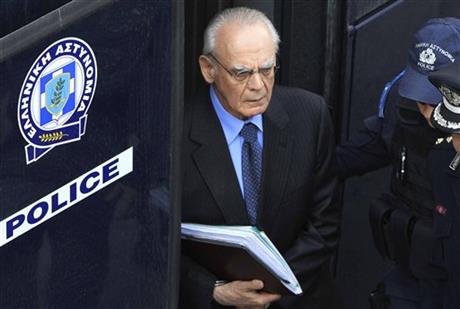
In this April 22, 2013 file photo, former Greek Defense Minister Akis Tsochadzopoulos, centre, arrives at court for the start of long anticipated corruption trial into allegations of kickbacks in defense contracts. An Athens court handed down a guilty verdict on Monday, Oct. 7, 2013 against the former defense minister on money laundering charges stemming from military purchases, in the most prominent corruption case to date in the financially-stricken country. (AP Photo/FOSPHOTOS/Panagiotis Tzamaros)
ATHENS, Greece (AP) — A former Greek defense minister was found guilty of money laundering on Monday in the most prominent corruption case to date in the financially stricken country.
An Athens court found Akis Tsochadzopoulos, a prominent figure in past Socialist governments, guilty along with 16 of his 18 co-defendants, including his wife, ex-wife and daughter, after a five-month trial. He had spent nearly a year and a half in jail in pre-trial detention, as had his wife, daughter and other close associates.
Prosecutor Georgia Adeilini demanded a 20-year prison sentence for Tsochadzopoulos, and 6 to 13 years for the other defendants. Sentencing was expected later Monday.
In March, a court had sentenced the 73-year-old Tsochadzopoulos to eight years in prison for submitting false income declarations. It also ordered the seizure of his home in central Athens and imposed a 520,000-euro ($706,800) fine.
The corruption case stems from a scandal over a contract for the purchase of German submarines and for Russian anti-aircraft missiles. Tsochadzopoulos had been accused of accepting bribes between 1997-2001 to award the contracts. Although the bribery charges are beyond the statute of limitations for a former minister, he was convicted of money laundering for using the proceeds of the alleged bribery.
The former minister had denied all the charges against him, and had accused the prosecution of conducting a politically motivated trial.
Tsochadzopoulos served as defense minister from 1996 to 2001 and development minister between 2001 and 2004. He was a prominent member of the Socialist PASOK party, which dominated Greek politics for the best part of the past three decades.
The party saw its public support hammered after the financial crisis broke out in late 2009 as the country suffered high unemployment and had to impose punishing austerity measures to reduce debt. PASOK is currently the junior partner in the conservative-led coalition government.



